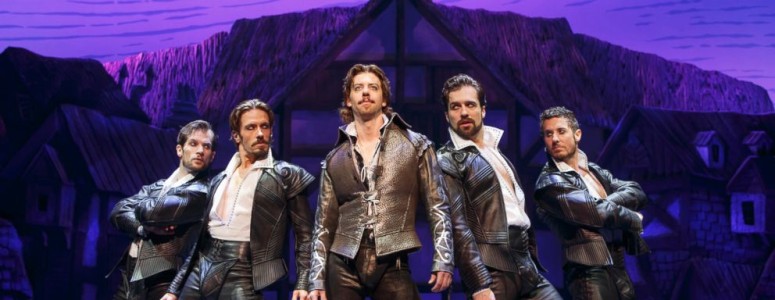No matter how good a song or production number is, theatergoers’ applause obviously has to stop sometime.
Once in a while, however, the audience so loves what it just experienced that it creates a marvelous phenomenon. The theatergoers applaud, then eventually let the handclaps abate – but then they decide they hadn’t rewarded the number enough. So they resume applauding and reach a louder level than they had before.
But at St. James Theatre where SOMETHING ROTTEN! is currently triumphing, I experienced a situation involving applause that I’d never before encountered – and I’ve seen more than 85% of the Broadway musicals of the last half-century.
At this wild and wonderful new musical, a production number situated midway through the first act obviously pleased its audience; all one had to do was hear the thunderclap of applause it gave. Naturally it abated but then got stronger than before in the way that I’ve described. But once that second wave diminished, it surged again, eclipsing both the two other bursts to register the highest level yet on the decibel meter.
Needless to say, we’re talking about a genuine showstopper here, and one that undoubtedly helped SOMETHING ROTTEN! to receive its ten Tony nominations.
But I’m not going to spoil this paragon of production numbers for you. All I’ll say is what leads up to it.
We’re in 1595, when everyone in London is enthralled with the plays of William Shakespeare – well, all but one rival playwright who claims that “The Bard” is not “THE Bard, merely “a bard” who steals from old plots and everything he encounters.
Given that this rival playwright has the name of Nick Bottom, he would seem to have a point.
Nick’s brother and collaborator Nigel is at the other end of the artistic spectrum. Nigel adores Shakespeare, to the utter fury of Nick. Brian d’Arcy James is hilarious in the way he expresses Nick’s Othello-level jealousy while John Cariani’s Nigel gets wonderfully moon-faced with hero-worship every time he chances to meet the great writer.
Shakespeare greets all with, to quote a line from one of his upcoming hits, “a patient shrug,” because he’s become so accustomed to everyone’s thinking he’s great. However, no one has a greater opinion of himself than he. Christian Borle excels here playing The Bard in Mick Jagger-fashion.
So what can Nick do? He’s not coming up with any good ideas that could better Shakespeare’s, so in desperation he turns to a soothsayer. The one he chooses turns out to be Nostradamus.
Those with a good knowledge of history will point out that Nostradamus died in 1566, almost thirty years before this show takes place. Ah, but that was the actual Nostradamus; this is Thomas Nostradamus, a distant relative. His ability to see into the future is a little distant, too. Think of a radio station that comes in and out of your car radio while you’re driving. Every now and then something sounds nice and clear, but most of the time it doesn’t. That’s Thomas, who’s worth doubting. He can only see and hear bits and pieces of the future.
Playing him is Brad Oscar, who isn’t on stage all that long, but his uproarious way of dealing with the future – now he sees it, now he doesn’t – was enough to get him one of those ten Tony nods.
Half a Nostradamus is better than none, and his advice results in that aforementioned showstopper. But co-composers and lyricists Karey and Wayne Kirkpatrick and John O’Farrell, who co-wrote the book with Karey have another ace trump up their sleeves. Given that the Puritans were intent on closing down London’s theater because they thought plays were automatically lewd and lascivious, we have Brother Jeremiah on the forefront of this movement. Brooks Ashmanskas is riotous as the preacher whose mind is as dirty as the streets of London on which he’s campaigning. A show that seems to be out simply to offer fun manages to include a sharp comment on religious hypocrisy, too.
And that’s not all. Brother Jeremiah’s daughter Portia (the Chenoweth-like Kate Reinders) and Nigel fall in love at first sight, replicating a plot as old as – well, Romeo and Juliet.
Casey Nicholaw has directed with the secure speed that he gave The Book of Mormon, and while his choreography may rely too much on dance that didn’t come into vogue for centuries, it still entertains.
For that matter, the lyrics often involve such anachronistic words (“gig”) and expressions (“poster boy”). Most of the time, however, the writers don’t need them to make the point so well made in Shakespeare in Love: the business of theater hasn’t changed all that much in four centuries.
One thing’s for sure. Karey and Wayne Kirkpatrick, who are siblings, have written something far more successful than the Bottom brothers ever could. SOMETHING ROTTEN! contains more laughs than all our other current Broadway shows combined. That phenomenal first act production number won’t be all you’ll be applauding wildly.




